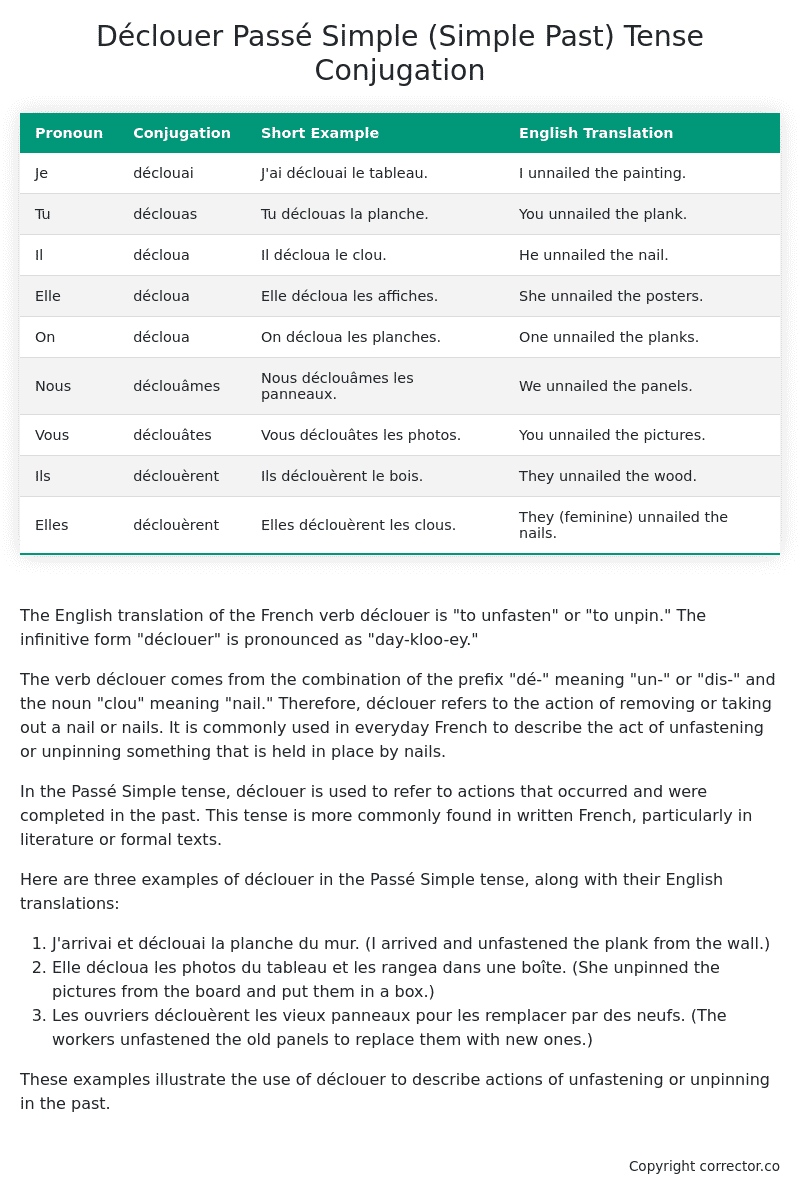Passé Simple (Simple Past) Tense Conjugation of the French Verb déclouer
Introduction to the verb déclouer
The English translation of the French verb déclouer is “to unfasten” or “to unpin.” The infinitive form “déclouer” is pronounced as “day-kloo-ey.”
The verb déclouer comes from the combination of the prefix “dé-” meaning “un-” or “dis-” and the noun “clou” meaning “nail.” Therefore, déclouer refers to the action of removing or taking out a nail or nails. It is commonly used in everyday French to describe the act of unfastening or unpinning something that is held in place by nails.
In the Passé Simple tense, déclouer is used to refer to actions that occurred and were completed in the past. This tense is more commonly found in written French, particularly in literature or formal texts.
Here are three examples of déclouer in the Passé Simple tense, along with their English translations:
- J’arrivai et déclouai la planche du mur. (I arrived and unfastened the plank from the wall.)
- Elle décloua les photos du tableau et les rangea dans une boîte. (She unpinned the pictures from the board and put them in a box.)
- Les ouvriers déclouèrent les vieux panneaux pour les remplacer par des neufs. (The workers unfastened the old panels to replace them with new ones.)
These examples illustrate the use of déclouer to describe actions of unfastening or unpinning in the past.
Table of the Passé Simple (Simple Past) Tense Conjugation of déclouer
| Pronoun | Conjugation | Short Example | English Translation |
|---|---|---|---|
| Je | déclouai | J’ai déclouai le tableau. | I unnailed the painting. |
| Tu | déclouas | Tu déclouas la planche. | You unnailed the plank. |
| Il | décloua | Il décloua le clou. | He unnailed the nail. |
| Elle | décloua | Elle décloua les affiches. | She unnailed the posters. |
| On | décloua | On décloua les planches. | One unnailed the planks. |
| Nous | déclouâmes | Nous déclouâmes les panneaux. | We unnailed the panels. |
| Vous | déclouâtes | Vous déclouâtes les photos. | You unnailed the pictures. |
| Ils | déclouèrent | Ils déclouèrent le bois. | They unnailed the wood. |
| Elles | déclouèrent | Elles déclouèrent les clous. | They (feminine) unnailed the nails. |
Other Conjugations for Déclouer.
Le Present (Present Tense) Conjugation of the French Verb déclouer
Imparfait (Imperfect) Tense Conjugation of the French Verb déclouer
Passé Simple (Simple Past) Tense Conjugation of the French Verb déclouer (You’re reading it right now!)
Passé Composé (Present Perfect) Tense Conjugation of the French Verb déclouer
Futur Simple (Simple Future) Tense Conjugation of the French Verb déclouer
Futur Proche (Near Future) Tense Conjugation of the French Verb déclouer
Plus-que-parfait (Pluperfect) Tense Conjugation of the French Verb déclouer
Passé Antérieur (Past Anterior) Tense Conjugation of the French Verb déclouer
Futur Antérieur (Future Anterior) Tense Conjugation of the French Verb déclouer
Subjonctif Présent (Subjunctive Present) Tense Conjugation of the French Verb déclouer
Subjonctif Passé (Subjunctive Past) Tense Conjugation of the French Verb déclouer
Subjonctif Imparfait (Subjunctive Imperfect) Tense Conjugation of the French Verb déclouer
Subjonctif Plus-que-parfait (Subjunctive Pluperfect) Tense Conjugation of the French Verb déclouer
Conditionnel Présent (Conditional Present) Tense Conjugation of the French Verb déclouer
Conditionnel Passé (Conditional Past) Tense Conjugation of the French Verb déclouer
Conditionnel Passé II (Conditional Past II) Tense Conjugation of the French Verb déclouer
L’impératif Présent (Imperative Present) Tense Conjugation of the French Verb déclouer
L’impératif Passé (Imperative Past) Tense Conjugation of the French Verb déclouer
L’infinitif Présent (Infinitive Present) Tense Conjugation of the French Verb déclouer
L’infinitif Passé (Infinitive Past) Tense Conjugation of the French Verb déclouer
Le Participe Présent (Present Participle) Tense Conjugation of the French Verb déclouer
Le Participe Passé (Past Participle) Tense Conjugation of the French Verb déclouer
Struggling with French verbs or the language in general? Why not use our free French Grammar Checker – no registration required!
Get a FREE Download Study Sheet of this Conjugation 🔥
Simply right click the image below, click “save image” and get your free reference for the déclouer Passé Simple tense conjugation!

Déclouer – About the French Passé Simple (Simple Past) Tense
Formation
Usage
Narration
Historical Context
Interactions with other tenses
Passé Composé
Imparfait
Conditional and Subjunctive
Summary
I hope you enjoyed this article on the verb déclouer. Still in a learning mood? Check out another TOTALLY random French verb conjugation!


